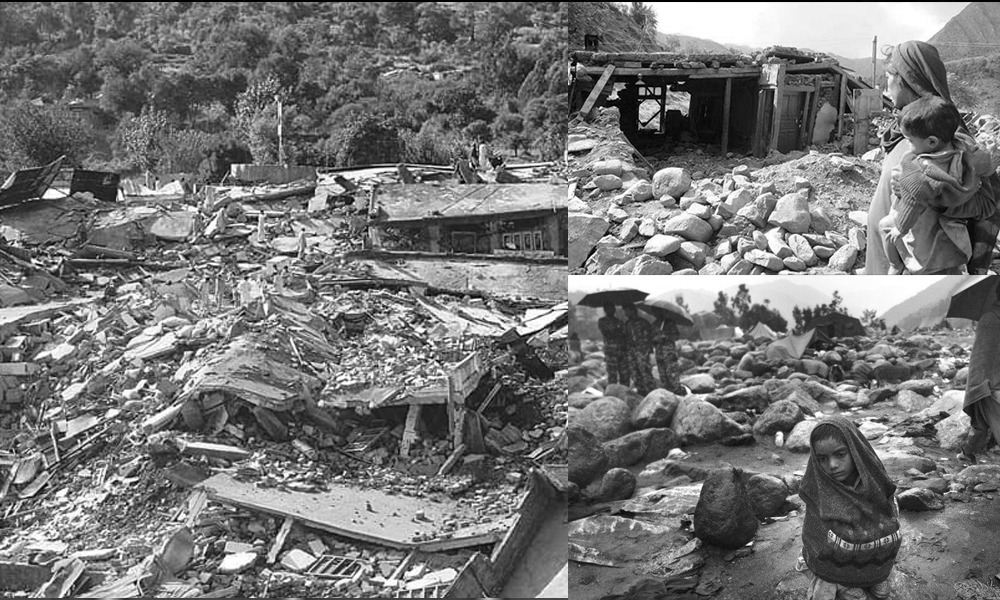A Shattered Morning of 2005

20 years back earth shook in Pakistan, 8 October Earthquake 2005.
Twenty years ago today, a powerful earthquake struck northern Pakistan, leaving a trail of destruction, despair, and death in its wake. The 7.6-magnitude quake, which occurred at 08:50 a.m. on October 8, 2005, devastated Azad Jammu and Kashmir, the Khyber Pakhtunkhwa town of Balakot, and parts of Indian-administered Jammu and Kashmir.
Affected areas of Pakistan on 8th October 2025.
Yet, two decades later, many survivors say the real tragedy is not just what happened on that morning — but what has not happened since.
The quake’s epicenter lay 19 kilometers northeast of Muzaffarabad, the capital of Azad Jammu and Kashmir. Measuring XI on the Mercalli Intensity Scale — classified as “Extreme” — it reduced entire towns to rubble within seconds. Schools, hospitals, homes, and roads crumbled as if made of sand.
It was a school day. An estimated 19,000 children died in collapsed classrooms, many of them never recovered. For families who had just finished their pre-dawn Ramadan meals, the early morning nap turned into a nightmare. Thousands, particularly women inside homes, were crushed under debris.
The official death toll in Pakistan was 87,350, although some estimates suggest the number could be over 100,000. In India, 1,360 lives were lost, while four people died in Afghanistan.
More than 780,000 buildings were destroyed or rendered uninhabitable. Entire neighborhoods disappeared in Muzaffarabad and Balakot, where up to 90% of buildings were flattened. At least 574 health facilities were damaged or destroyed — with 320 completely lost in Pakistan. Communication networks collapsed, and emergency services were overwhelmed.
For the more than 3.5 million people left homeless, survival became a second battle — this time against exposure and disease. Makeshift shelters, brutal winters, and lack of access to basic healthcare claimed many more lives in the weeks that followed.
Promises Made, Promises Broken?
In the immediate aftermath, pledges of international aid poured in. Donors, NGOs, and governments promised swift rehabilitation and long-term rebuilding. Yet, twenty years later, much of that promise remains unfulfilled.
Broken city with broken promises.
In Balakot, where the government vowed to build a new, modern city for survivors — “New Balakot City” — most of the affected families still live in temporary housing. The new city remains largely uninhabited, marred by legal wrangles, delayed funding, and allegations of corruption.
Hospitals and schools have been rebuilt in some areas, but many remain in fragile condition. Locals in parts of Muzaffarabad and remote mountain villages report lack of access to clean water, healthcare, and safe housing. Roads that were damaged in 2005 have yet to be fully repaired.
“The world moved on, but we couldn’t,” says Shazia Bibi, a survivor who lost her three children when their school collapsed. “We are still waiting for our lives to be rebuilt.”
A Wake-Up Call Ignored?
The 2005 earthquake should have been a watershed moment for seismic safety in Pakistan — a country that lies in a high-risk seismic zone. Instead, many of the same unsafe building practices continue. Experts warn that the country remains dangerously unprepared for another major quake.
The day earth shook in Pakistan.
Still, amid the pain and abandonment, stories of resilience shine through. Survivors have rebuilt their lives the best they could. Community-based organizations have stepped in where the state has failed. Children orphaned in the quake are now young adults, many of whom are working to improve conditions in their hometowns.
Remembrance of Martyrs:
Today, memorials are being held across Azad Jammu and Kashmir and Khyber Pakhtunkhwa. Prayers echo in mosques, schools hold remembrance assemblies, and families gather at mass graves to honor the lost.
Read More News On
Catch all the Business News, Breaking News Event and Latest News Updates on The BOL News
Download The BOL News App to get the Daily News Update & Live News.